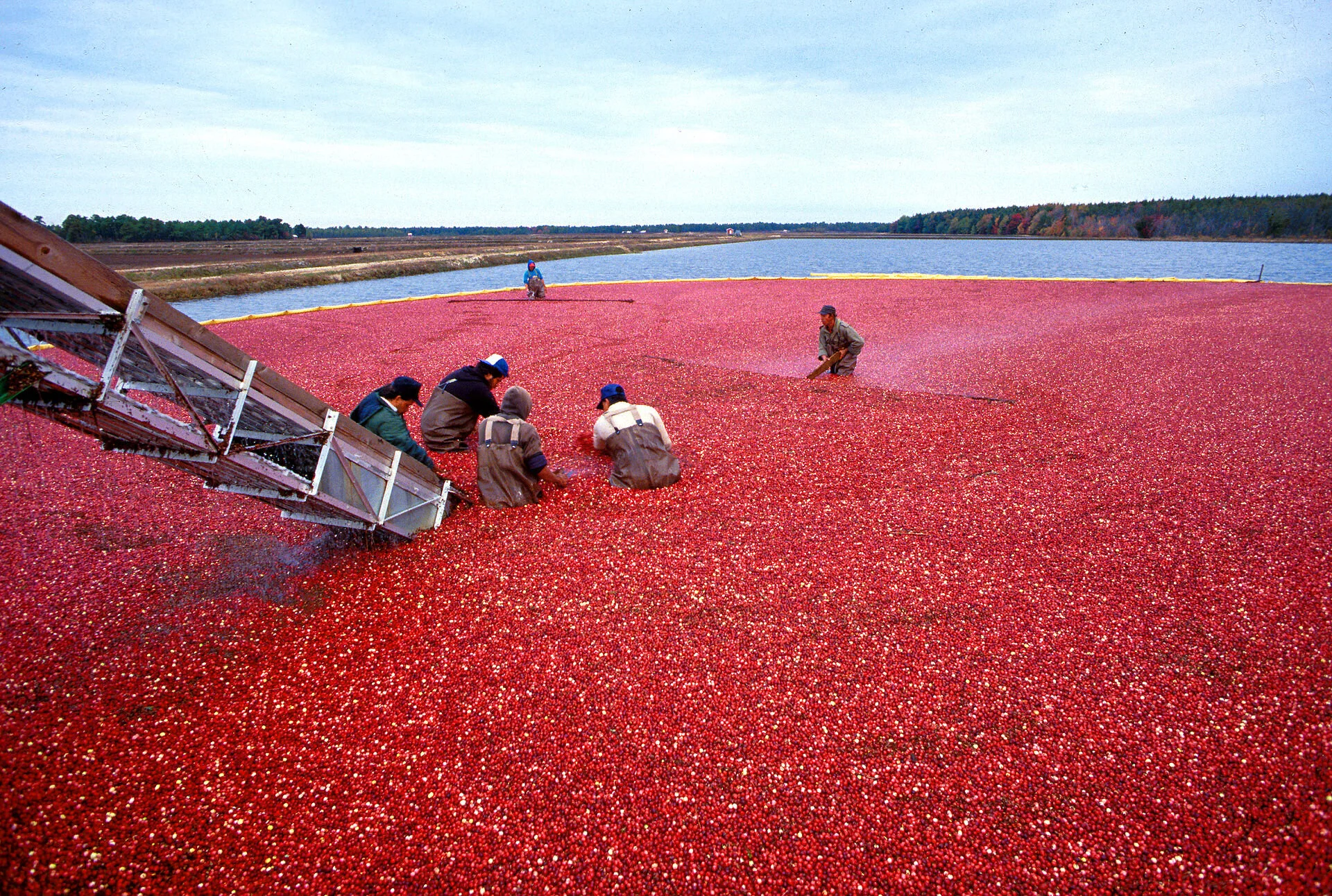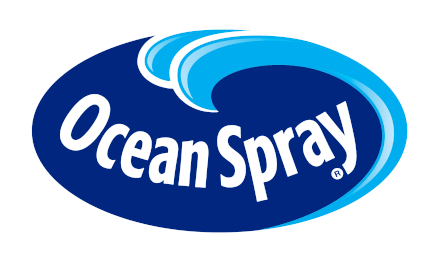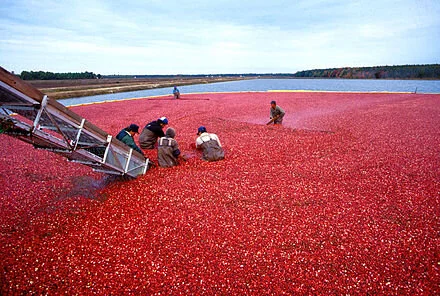
Ocean Spray’s ‘Planet, Product, People, Prosperity’ pillars
Cranberry harvest time in Kingston Mass.
— Photo by Mathcar
Edited from a New England Council report.
Ocean Spray recently released its Environmental, Social and Governance (ESG) Report, emphasizing its four pillars of Planet, Product, People and Prosperity.
In the inaugural report, Ocean Spray explains and analyzes the company’s ESG work and solidifies its alignment with sustainability and equity. Ocean Spray is an agricultural cooperative that works with 700 family farmers from the United States, Canada and Chile and sells its products in more than 100 countries. In the report’s materiality assessment, Ocean Spray illustrates the company’s priorities of “Generating Economic Value for the Cooperative, Product Information and Labeling, Product Safety and Quality, and Climate Change and GHG Emissions.”
“While the report itself may be a first for our organization, it represents more than 90 years of rich history—an always-present commitment to the environment, championed by the incredible people that have shaped our company for generations,” said CEO Tom Hayes. “One of the hallmarks of our cooperative structure and business practices, throughout our history, has always been sustainability. It is in our DNA. Today, our promise is to advance on this journey—to leverage holistic ESG strategy into actionable results, and further connect our farms to families for a better life.”
xxx
Ocean State, a growers’ cooperative now based in Middleborough, Mass., in southeastern Massachusetts’s cranberry-bog region, was formed in 1930, in Hanson, Mass., by three cranberry growers who wanted to expand their market. Led by growers Marcus L. Urann, Elizabeth F. Lee and John C. Makepeace, the cooperative worked to develop more cranberry-based products beyond cranberry sauce and cranberry juice cocktail. (A.D. Makepeace Company, one of the original founders of Ocean Spray, has been in continuous operation since the late 19th Century and is the world's largest grower of cranberries.)
“The Cranberry Harvest on the Island of Nantucket,’’ 1880 oil painting by Eastman Johnson
Tart but sustainable
— Photo by Keith Weller
From Robert Whitcomb’s “Digital Diary,’’ in GoLocal24.com
With New Englanders looking to expand local agriculture, and make the region a little less dependent on supplies from far away, the cranberry industry long concentrated in Southeastern Massachusetts is a good model of how to operate. (Current food-supply-chain problems caused by the pandemic are a reminder of the perils of over-dependence on far-away agribusinesses.) The Sustainable Agriculture Initiative has recognized the Ocean Spray cooperative, which represents about 65 percent of the Bay State’s growers, as engaged in sustainable farming.
Ocean Spray said:
“SAI validated Ocean Spray’s sustainable agriculture program and on-farm practices at a representative number of its farmer-owners’ farms against the FSA’s [Farm Service Agency] 112 questions, which measure farm sustainability holistically from soil health, to water conservation practices, to health and safety of farm workers and local communities.’’
The co-op is also working with the National Geographic Society to support the expansion of sustainable agriculture around the world. Ocean Spray said it “will support National Geographic fieldwork across the globe to aid in agriculture practices that help preserve the health of the planet. The field work includes projects such as bee-friendly agriculture, automated land-use, insect collection and biodiversity discovery, and global mapping of center pivot {irrigation} agriculture.’’
Hit this link to learn more:
April 3 update from N.E. Council on COVID-19 response
Harvesting cranberries in the fall in southeastern Massachusetts
Ocean Spray is raising wages and making donations to farm regions in the crisis
April 3 update from The New England Council (newenglandcouncil.com):
As our region and our nation continue to grapple with the Coronavirus Disease (COVID-19) pandemic, The New England Council is using our blog as a platform to highlight some of the incredible work our members have undertaken to respond to the outbreak. Each day, we’ll post a round-up of updates on some of the initiatives underway among Council members throughout the region. We are also sharing these updates via our social media, and encourage our members to share with us any information on their efforts so that we can be sure to include them in these daily round-ups.
You can also check our COVID-19 Virtual Events Calendar for information on upcoming COVID-19 related programming – including Congressional town halls and webinars presented by NEC members.
Medical Response
Boston Convention & Exposition Center Become Commonwealth’s First Field Hospital – Amid predictions that Massachusetts cases of COVID-19 could arrive next week, Governor Charlie Baker (R-MA) announced that the Boston Convention and Exhibition Center (BCEC)—owned by the Massachusetts Convention Center Authority—will become the commonwealth’s first field hospital. Officials plan for 1,000 beds total, split evenly between the city’s homeless population and overflow patients from area hospitals. WBUR has more.
Partners HealthCare Brings Mask Sterilizer to Massachusetts – Confronting an impending shortage of protective equipment and other personal protective equipment for healthcare workers, Partners HealthCare has entered into a partnership to bring a machine that can sterilize up to 80,000 respirator masks a day to Massachusetts. The device, described as a “game changer” for the region’s response, could reduce strain on dwindling supplies and possibly serve all hospitals in New England, according to the Massachusetts Health & Hospital Association. Read more in NBC.
Sanofi Prepares to Produce Millions of Doses of Potential Treatment – Should a now-famous malaria drug prove effective in combatting the coronavirus, Sanofi has confirmed it has the potential to produce hundreds of millions of doses of hydroxychloroquine. In addition, the pharmaceutical company has ensured its supply chain remains stable. Read more in The Wall Street Journal.
Economic/Business Continuity Response
Duane Morris Offers Guidance on Employment Retention Assistance – A guide to the options businesses have for assistance under the recent stimulus package provided by Duane Morris gives the business community clarity on eligibility, the scope of the package, and limitations of assistance. Read the guide in Forbes.
Ocean Spray Increases Wages, Donates Meals to Farmer Regions – To support its employees who continue to work despite personal safety concerns, Ocean Spray is increasing wages and providing an extra week of vacation to front-line employees. In addition to the wage increases, the company also plans to donate 100,000 meals to its farm regions across the country. Fox Business has more.
Dell Provides Resources for Remote Work Transition – As businesses of all types and sizes navigate an abrupt transition to remote work, Dell is offering a host of online materials to support and expedite the move. Webinars from senior executives on employee flexibility and posts highlighting the importance of cybersecurity are just some of the services Dell is offering for the business community. More can be found here.
Community Response
American Hospital Association Successfully Urges Administration for Direct Assistance to Hospitals – After pressure from lawmakers and healthcare organizations across the country, including a letter from the American Hospital Association (AHA), the Trump Administration is now planning to pay hospitals to treat uninsured patients with COVID-19. The letter from AHA calls for direct aid as well as the expansion of infrastructure investment assistance, among other things. The Wall Street Journal
Endicott College President Profiled on Leading a College Through Crisis – NEC Board Member Steven DiSalvo, president of Endicott College, was profiled in the Boston Business Journal highlighting his leadership during a pandemic that has sent his students home and grinded daily operations to a halt. DiSalvo discussed the school’s commitment to fully pay employees through June, and the potential benefits the switch to online learning could provide for its online graduate offerings. Read the profile here.
Stay tuned for more updates each day, and follow us on Twitter for more frequent updates on how Council members are contributing to the response to this global health crisis.
College Hall at Endicott College, in Beverly, a former industrial town part of which is a rich Boston suburb with old Brahmin as well as new money.
Ocean Spray invents four cranberry-herbal blends
Harvesting cranberries
From The New England Council (newenglandcouncil.com):
“Ocean Spray has launched its first ever new brand — ‘Atoka,’ a line of healthy, plant-based drinks. Founded in 1930, Ocean Spray is an agricultural cooperative owned by more than 700 cranberry farmers in the United States, Canada and Chile. {The heart of New England’s cranberry production is southeastern Massachusetts.}
The new brand’s products were developed by the Lighthouse, the cooperative’s innovation incubator in Boston’s Seaport District. Ocean Spray founded the Lighthouse to incite creative collaboration that would help keep their cranberry products modern, unique, and wellness focused. The cooperative’s farmer-owned structure inspired the Lighthouse team to create sustainable, nourishing food products. Atoka will introduce four cranberry-herbal blends in January of 2020 as Tea Tonics, Oatmilks Elixirs and Herbal Shots.
“Atoka is the first new brand to be incubated here in Boston at the Lighthouse, indicative of our emphasis on an intensely innovative, agile approach to product development and cultivating a culture of innovation throughout the organization,” said Rizal Hamdallah, global chief innovation officer at Ocean Spray. ‘Atoka brings Ocean Spray into an entirely new category of wellness drinks.”’
The Council congratulates Ocean Spray on their new brand, Atoka, and celebrates its mission of providing nourishing, wellness-focused products








